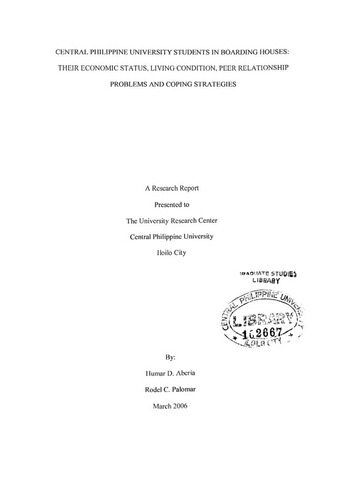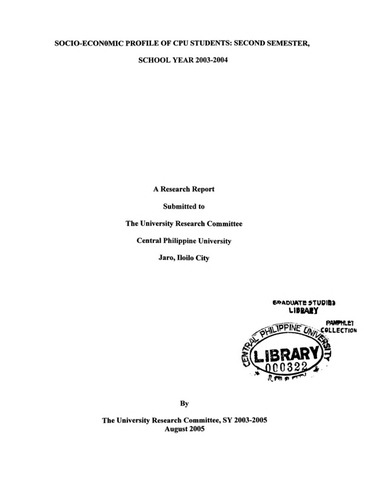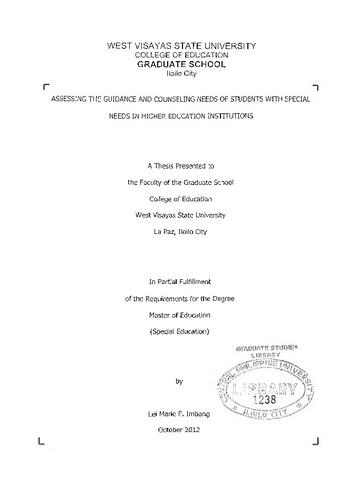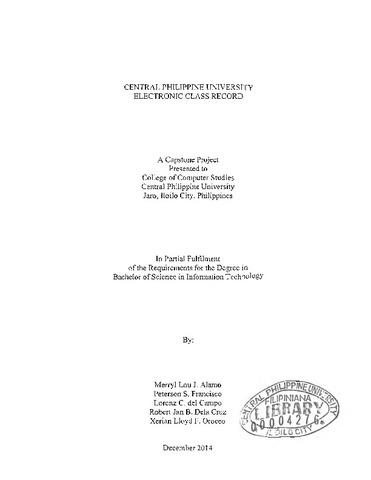Central Philippine University students in boarding houses: Their economic status, living condition, peer relationship problems and coping strategies
摘要
This descriptive-qualitative investigation attempted to determine the economic status, living condition, peer relationship, problems, and coping strategies of CPU students staying boarding houses. Data for this investigation were gathered from 360 randomly selected students of the University using three data-gathering instruments: the Interview Schedule, Focus Group Discussion (FGD) Guide and Interview Guide. The Interview Schedule was face and content validated and revised. The data were presented in frequency distribution tables and substantiated by FGD result and interview of key informants. Result of the investigation revealed the respondents were mostly 17 years old and above, female, not work students and come from rural areas of the province of Iloilo. The greater majority of the students’ fathers are farmers and government employees while most of their mothers are teachers and housewives. Most of the respondents have their own house built in their own lot, get their drinking water mostly from deep well and mineral water and use water sealed or flush toilets. Most of the respondents rent a bed space in the boarding house, paid for their stay on a monthly basis, use either charcoal or liquefied petroleum gas for cooking and buy purified or mineral water to drink. Most boarding houses where the respondents stay have separate flush toilets and bathrooms for male and female boarders. The number and dimension of bedrooms and boarders per room varies, however the average student per space ratio is 25.59 square feet per person. Electric fans are the most common appliance used while television is allowed to be used by many owners. Electricity is commonly used for ironing clothes and most students wash their own clothes. The respondents encountered numerous problems at home, in the boarding house and in relating to others where they employed various coping strategies to solve or face the problems. The respondents find it cheaper to stay in the boarding house than in the dormitories of the University.
描述
Abstract only
建议引文
Aberia, H. D. & Palomar, R. C. (2006). Central Philippine University students in boarding houses: Their economic status, living condition, peer relationship problems and coping strategies (Research report). Jaro, Iloilo City: University Research Center, Central Philippine University.
文件类型
Technical Report主题
货架位置
GSL 330.72 Ab37c
物理描述
v, 98 leaves
集合
- Research reports [42]
- Research reports [167]
The following license files are associated with this item:
Except where otherwise noted, this item's license is described as Attribution-NonCommercial-NoDerivs 3.0 Philippines
相關項目
顯示由標題,作者,創造者和主題相關的項目。
-
Socio-economic profile of CPU students: Second semester, school year 2003-2004
University Research Committee (Central Philippine University, 2005-08)This survey was conducted in order to determine the profile of the students of Central Philippine University for the second semester of SY 2003-2004. This study was descriptive in nature and employed the survey approach. ... -
Assessing the guidance and counseling needs of students with special needs in higher education institutions
Imbang, Lei Marie F. (2012)The increase in number of students with special needs in higher education institutions necessitates greater understanding of their needs. The purpose of this study was to determine the guidance and counseling needs of ... -
Central Philippine University electronic class record
Alamo, Merryl Lou J.; Francisco, Peterson S.; Del Campo, Lorenz C.; Dela Cruz, Robert Jan B.; Oroceo, Xerian Lloyd F. (2014)This study was designed to develop an Electronic Class Record for Central Philippine University. It focused on the following objectives: provide a synching module that allows the faculty to retrieve and constantly update ...






